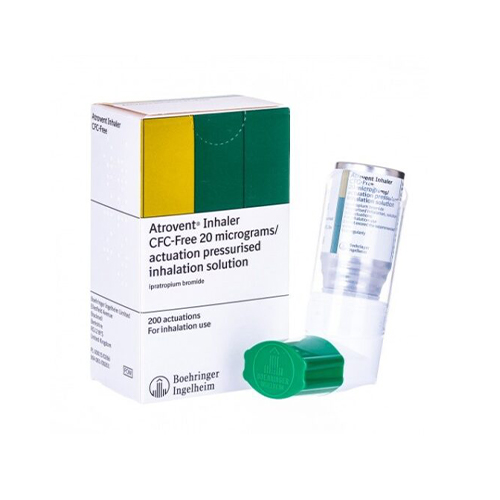- For Asthma & COPD
- Reduces inflammation
- Contains Ipratropium
Atrovent
Atrovent Inhalers are used regularly to keep the airways open in patients with asthma and Chronic Obstructive Pulmonary Disease (COPD)
What is Atrovent?
Atrovent Metered Aerosol contains the active ingredient ipratropium bromide monohydrate. It belongs to a group of medicines called anticholinergic bronchodilators.
Atrovent Metered Aerosol opens up the air passages in people suffering from asthma and chronic obstructive pulmonary disease (COPD).
It begins to act quickly after use and takes to 2 hours to give maximum benefit.
How to use Atrovent
Each puff must be properly inhaled through the mouth for Atrovent Metered Aerosol to work.
Follow all directions given to you by your doctor or pharmacist carefully. They may differ from the information contained in this leaflet.
If you are not sure how to use the inhaler, ask your doctor or pharmacist for help.
How much to use
The usual doses for adults are stated below.
2 to 4 puffs, three to four times daily (at regular intervals), up to a maximum of 16 puffs a day.
When to use it
Use your medicine at about the same time each day. Using it at the same time each day will have the best effect. It will also help you remember when to use it.
If you forget to use it
If it is almost time for your next dose, skip the dose you missed and have your next dose when you are meant to.
Otherwise, use it as soon as you remember, and then go back to using your medicine as you would normally.
Do not use a double dose to make up for the dose that you missed. This may increase the chance of you getting an unwanted side effect.
If you are not sure what to do, ask your doctor or pharmacist.
How long to use it for
Continue using Atrovent Metered Aerosol for as long as your doctor tells you. Atrovent Metered Aerosol helps control your condition, but does not cure it. It is important to keep using it even if you feel well.
If you use too much (overdose)
Immediately telephone your doctor or pharmacist. Do this even if there are no signs of discomfort or poisoning. You may need urgent medical attention.
Symptoms of an overdose may include:
- Fast or irregular heartbeat
- Dry mouth
- Blurred vision
Maintaining your inhaler
Cleaning
Clean and dry your mouthpiece at least once a week. It is important to keep the mouthpiece of your inhaler clean and dry. It may not work as well if it gets dirty. Follow the instructions at the end of this leaflet for cleaning your mouthpiece.
Storage
Keep your inhaler in a cool dry place where the temperature stays below 25°C.
Do not store Atrovent Metered Aerosol or any other medicine in the bathroom or near a sink.
Do not leave it in the car on hot days or on window sills. Heat and dampness can destroy some medicines.
Keep it where children cannot reach it. A locked cupboard at least one and a half metres above the ground is a good place to store medicines.
Disposal
If your doctor or pharmacist tells you to stop using Atrovent Metered Aerosol or it has passed its expiry date, ask your pharmacist what to do with any that are leftover.
Do not puncture the container or throw it into a fire.
Side effects & precautions
When you must not use it
Do not use Atrovent Metered Aerosol if you have an allergy to:
- Ipratropium bromide
- Similar medicines which contain atropine or medicines like atropine
- Any of the ingredients listed at the end of this leaflet
Do not use Atrovent Metered Aerosol after the expiry date printed on the pack or if the packaging is torn or shows signs of tampering. If it has expired or is damaged, return it to your pharmacist for disposal.
Before you start to use it
Tell your doctor if you have allergies to any other medicines, foods, preservatives or dyes. Tell your doctor or pharmacist if you are pregnant, intend to become pregnant, are breastfeeding or plan to breastfeed. Your doctor or pharmacist will discuss the possible risks and benefits of using Atrovent Metered Aerosol during pregnancy and breastfeeding.
Tell your doctor specifically if you suffer from any of the following medical conditions:
- Glaucoma (high pressure in the eye)
- Difficulty or pain when passing urine
- Constipation
- Cystic fibrosis
Using other medicines
Tell your doctor or pharmacist if you are using any other medicines,
Some medicines and Atrovent Metered Aerosol may interfere with each other. These include:
- Medicines used to treat heart problems such as adrenaline
- Medicines used to treat asthma or COPD such as theophylline, salbutamol and tiotropium.
Driving
Be careful driving or operating machinery until you know how Atrovent Metered Aerosol affects you. Atrovent Metered Aerosol may cause dizziness and blurred vision in some people. If you have any of these symptoms, do not drive, operate machinery or do anything else that could be dangerous. Children should be careful when performing physical activities
This medicine helps most people with asthma or COPD, but it may have unwanted side effects in a few people. All medicines can have side effects. Sometimes they are serious, most of the time they are not. You may need medical treatment if you get some of the side effects.
Common side-effects
- Headache
- Dizziness
- Dry or sore mouth
- Throat irritation
- Cough
- Nausea, vomiting
- A change in bowel movements (e.g. constipation, diarrhoea)
- Wind, indigestion, reflux (an unusual backflow of fluid)
These symptoms subside and are usually mild. Inform your doctor or pharmacist.
Serious side-effects
- Difficulty passing urine
- Difficulty breathing or worsening of your breathing problems
- Spasm of the muscles around the voice box, causing choking
- Swelling of the throat
- Fast or irregular heartbeat, also called palpitations
- Pounding heartbeat
Immediately consult medical advice.
Allergic reaction
- Shortness of breath
- Wheezing or troubled breathing
- Swelling of the face, lips, tongue or other parts of the body
- Rash, itching or hives on the skin.
- Irritation or a feeling of having something in the eye, dilated pupils, blurred vision, visual halos or coloured images.
Call 999 straight away
Documentation
Atrovent Patient Information Leaflet (PIL)



We’re here to help.
Our friendly team is available to help Monday to Friday 9:00am - 5:00pm.
If you need urgent assistance, do not use this service. Call 111, or in an emergency call 999.

